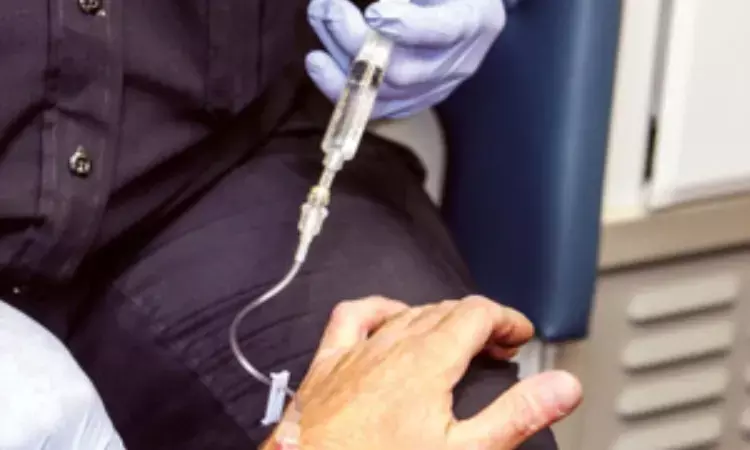- Home
- Medical news & Guidelines
- Anesthesiology
- Cardiology and CTVS
- Critical Care
- Dentistry
- Dermatology
- Diabetes and Endocrinology
- ENT
- Gastroenterology
- Medicine
- Nephrology
- Neurology
- Obstretics-Gynaecology
- Oncology
- Ophthalmology
- Orthopaedics
- Pediatrics-Neonatology
- Psychiatry
- Pulmonology
- Radiology
- Surgery
- Urology
- Laboratory Medicine
- Diet
- Nursing
- Paramedical
- Physiotherapy
- Health news
- Fact Check
- Bone Health Fact Check
- Brain Health Fact Check
- Cancer Related Fact Check
- Child Care Fact Check
- Dental and oral health fact check
- Diabetes and metabolic health fact check
- Diet and Nutrition Fact Check
- Eye and ENT Care Fact Check
- Fitness fact check
- Gut health fact check
- Heart health fact check
- Kidney health fact check
- Medical education fact check
- Men's health fact check
- Respiratory fact check
- Skin and hair care fact check
- Vaccine and Immunization fact check
- Women's health fact check
- AYUSH
- State News
- Andaman and Nicobar Islands
- Andhra Pradesh
- Arunachal Pradesh
- Assam
- Bihar
- Chandigarh
- Chattisgarh
- Dadra and Nagar Haveli
- Daman and Diu
- Delhi
- Goa
- Gujarat
- Haryana
- Himachal Pradesh
- Jammu & Kashmir
- Jharkhand
- Karnataka
- Kerala
- Ladakh
- Lakshadweep
- Madhya Pradesh
- Maharashtra
- Manipur
- Meghalaya
- Mizoram
- Nagaland
- Odisha
- Puducherry
- Punjab
- Rajasthan
- Sikkim
- Tamil Nadu
- Telangana
- Tripura
- Uttar Pradesh
- Uttrakhand
- West Bengal
- Medical Education
- Industry
Prehospital pain management: Evidence-Based Guideline

USA: A recent guideline published in the journal Prehospital Emergency Care contains evidence-based guidelines for the administration of analgesics for moderate to severe pain by Emergency Medical Services (EMS) clinicians. The guideline was based on a separate, previously published, a systematic review of the comparative effectiveness of analgesics in the prehospital setting prepared by the University of Connecticut Evidence-Based Practice Center for the Agency for Healthcare Research and Quality (AHRQ).
For developing it, a technical expert panel (TEP) was assembled consisting of subject matter experts in the development of evidence-based guidelines patient care guideline, and prehospital and emergency care. Based on the Key Questions identified in the AHRQ systematic review, a series of nine "patient/population-intervention-comparison-outcome" (PICO) questions were developed, and an additional PICO question was developed to specifically address analgesia in pediatric patients.
Given below are the key recommendations:
- The authors recommend in favor of intranasal (IN) fentanyl over intramuscular (IM) or intravenous (IV) opioids in the treatment of moderate to severe pain in pediatric patients prior to IV access or without (or without indication for) IV access (strong recommendation, low certainty of evidence). The panel makes a conditional recommendation for either IN fentanyl or IV opioids once IV access is established.
- The authors suggest in favor of IV acetaminophen (APAP) over IV opioids alone for the initial management of moderate to severe pain in the prehospital setting if IV APAP is available, affordable, and easy to administer.
- The authors suggest either IV NSAIDS or IV opioids for the initial management of moderate to severe pain in the prehospital setting.
- The authors suggest in favor of IV NSAIDs over IV APAP for the initial management of moderate to severe pain in the prehospital setting. Additionally, we recommend in favor of either PO NSAIDs or PO APAP for the initial management of pain in the prehospital setting if an oral analgesic is considered.
- The authors suggest either IV ketamine or IV NSAIDs for the initial management of moderate to severe pain in the prehospital setting.
- The authors suggest either IV ketamine or IV opioids for the initial management of moderate to severe pain in the prehospital setting.
- If opioids are selected for pain management, the authors suggest either IV morphine or IV fentanyl for the treatment of moderate to severe pain in the prehospital setting.
- The authors suggest against the combination of weight-based IV opioid plus weight-based IV ketamine versus weight-based IV opioid alone for the initial management of moderate to severe pain in the prehospital setting.
- No recommendation was made at this time on the comparison between the combination of an IV opioid plus IV ketamine, versus IV ketamine alone for the initial management of moderate to severe pain in the prehospital setting due to significant uncertainty of the evidence and incomplete information concerning the comparison.
- No recommendation was made regarding the comparison between nitrous oxide versus IV opioids for the initial management of moderate to severe pain in the prehospital setting.
To conclude, the recommendations emphasize that EMS medical directors and EMS clinicians have a variety of effective options for the management of moderate to severe pain in addition to opioids when designing patient care guidelines and caring for patients suffering from acute pain.
Reference:
Jonathan R. Powell, Lorin R. Browne, Kyle Guild, Manish I. Shah, Remle P. Crowe, George Lindbeck, Sabina Braithwaite, Eddy S. Lang, Ashish R. Panchal, On behalf of the Technical Expert Panel. (2022) Evidence-Based Guidelines for Prehospital Pain Management: Literature and Methods. Prehospital Emergency Care 0:0, pages 1-8.
Dr Kamal Kant Kohli-MBBS, DTCD- a chest specialist with more than 30 years of practice and a flair for writing clinical articles, Dr Kamal Kant Kohli joined Medical Dialogues as a Chief Editor of Medical News. Besides writing articles, as an editor, he proofreads and verifies all the medical content published on Medical Dialogues including those coming from journals, studies,medical conferences,guidelines etc. Email: drkohli@medicaldialogues.in. Contact no. 011-43720751


